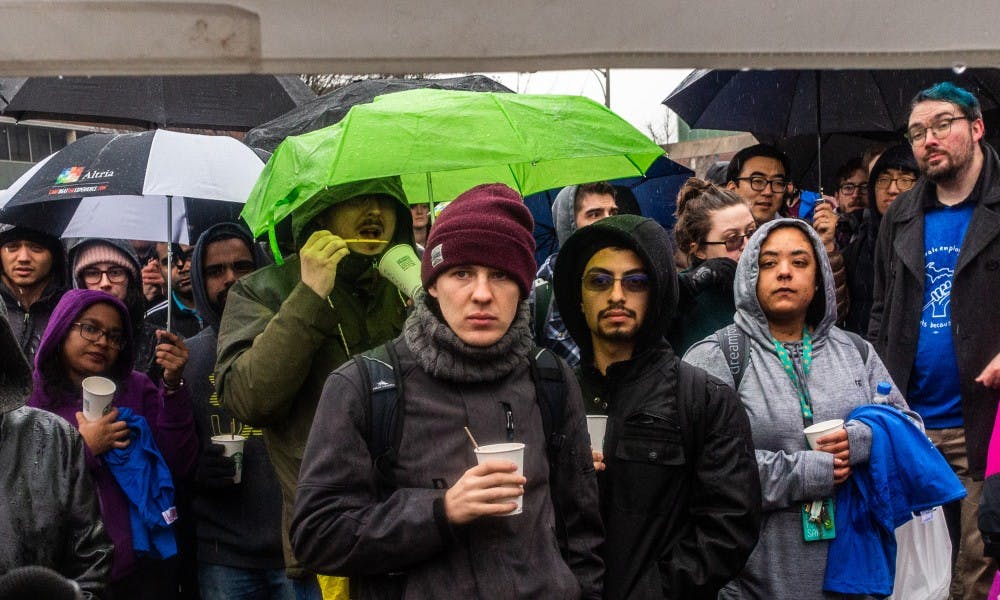The Graduate Employees Union, or GEU, of Michigan State — a labor union made up of graduate students employed by the university — held a teach-in rally Wednesday evening to shed light on its salary proposal, the ongoing contract negotiations taking place with MSU administration and other issues.
Taking place at the Rock on Farm Lane, the rally drew in a large crowd of dozens of students despite rain and near-freezing temperature.
“The plan here is to share with people the research that we've done, identifying problems at MSU right now that are facing graduate workers, and to also spread word of our solutions and to try to get support and energy behind what we're trying to negotiate for,” GEU Chief Information Officer Kevin Bird said.
During the event, GEU President Nick Rowe gave a speech about the need for MSU to provide a wage increase for graduate student employees that is competitive with other Big Ten schools.
“The administration likes to talk big about how competitively we’re compensated but when you look at the Big Ten, we’re ranked ninth in real income. Ninth," Rowe said. "That’s not competitive."
In the proposal the GEU put forward, they noted more than 50 percent of graduate employee's pay goes to rent.
“One of (MSU’s) HR flunkies asked us whether or not this income-based measure accounts for the fact that we’re part-time,” Rowe said. “The rent isn’t part-time. Your costs of eating are not part-time. Your cost of utilities are not part-time. The cost of being a person is not part-time.”
The most a graduate employee can be paid is $3,054 biweekly, and the lowest wage is $355 biweekly, according to MSU's HR website.
“At the moment, we don’t even make a living wage,” Rowe said in his speech.
International graduate students also spoke at the teach-in rally, drawing attention to the challenges they face at the university.
Graduate student Reshma Menon explained how when she first got accepted in her program, despite passing the Test of English as a Foreign Language, she was required to take an English-speaking proficiency exam through the university. The exam, called the MSU Speaking Test, determines if non-native English speaking graduate students meet MSU’s speaking proficiency requirement for teaching assistants. As a student from India — where English is recognized as an official language — Menon speaks it fluently and considers it her first language. She previously taught English as well.
“Even though I passed the speaking test, I know of someone else whose educational background was almost identical to mine from India who failed the speaking test,” Menon said. “The only difference in the two of us speaking is perhaps a little bit of a heavier accent. And so this tells me that ‘non-native English speakers’ really means, ‘from a country that is traditionally not viewed as an English speaking country’ or, ‘people with accents that we do not understand or do not want to understand.'"
Additionally, doctoral student Katie Carline — an international student from Canada — was told she would be required to take the MSU Speaking Test as well. When checking in on the day of the exam, Carline said was told she wouldn't have to based on her appearance and the way she spoke.
“This clearly shows the inconsistency in MSU administration of the speak test, and the lack of clarity and fairness in this process — and the decisions about who speaks English well enough to be a TA,” Carline said.
Carline, who is also the vice president of contract negotiations and enforcement of the GEU, is bargaining with the university to revise the new contract and update the MSU Speaking Test.
Several speakers at the teach-in rally Wednesday evening emphasized the need to improve Relationship Violence and Sexual Misconduct, or RVSM, policy and training at MSU. Specifically, the RVSM training required for graduate students that includes the mandatory reporting policy.
As a part of this policy, any information involving sexual misconduct or relationship violence experienced by a student must be reported to the Office of Institutional Equity and MSU Police. Graduate student Jeremy Pardo said mandatory reporters may be forced to tell the university things their friends or partners did not want shared.
"Too often, this policy requires graduate employees to violate the trust of a survivor and strip their agency by reporting to the university against the survivors wishes and without their consent," Pardo said.
GEU members also said they want to establish an in-person training session instead of online training.
Another issue brought up at the rally was support for graduate student employees who are parents. Graduate student Ben Espinoza said he and his wife spend roughly $600 a month on childcare even with help from family who live in the area.
Support student media!
Please consider donating to The State News and help fund the future of journalism.
“Other universities have paved the way of providing support for students with children,” Espinoza said.
He explained that when people hear about the lack of support offered at MSU, they enroll in other universities that provide the needed assistance.
"I’m asking all of you — those of us with kids and those of us without — please support us in our efforts to acquire subsidies for childcare. As you well know, if universities help and support groups in need, everybody benefits," Espinoza said. "Our struggles as graduate students of all different kinds are different, but we're in this fight together."
Discussion
Share and discuss “'We don’t even make a living wage': Grad employees call for change at rally” on social media.







